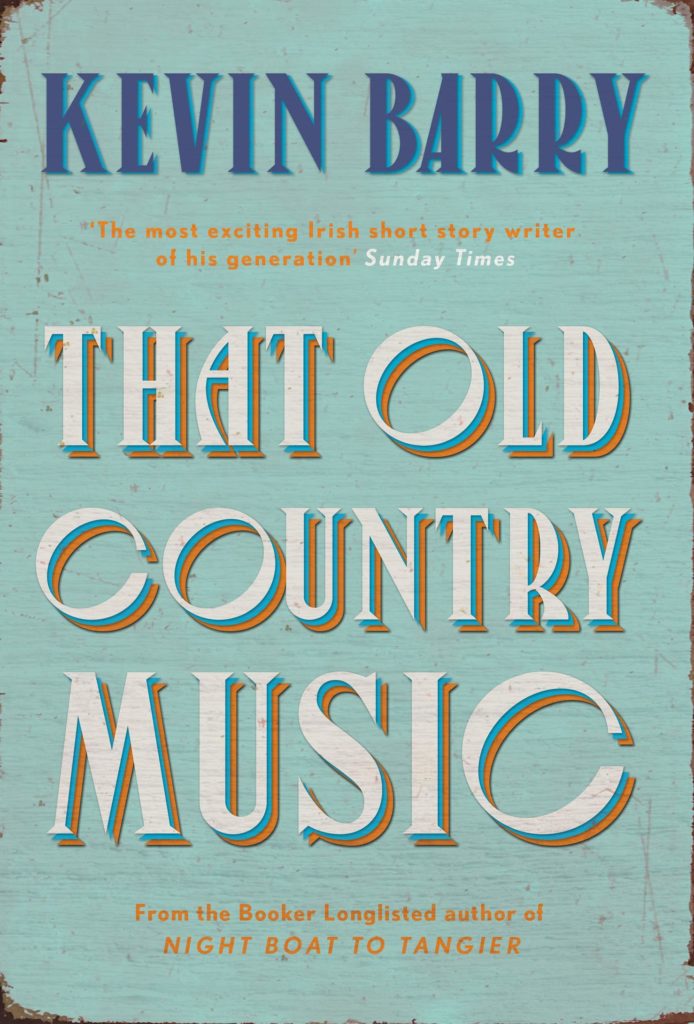Published last month by Canongate, ‘That Old Country Music’ — by ‘Night Boat to Tangier’ author Kevin Barry — is a collection of stories filled with love, melancholy and magic. We asked Wendy Erskine, fellow esteemed storyist, to take a look.

In the song ‘Let the Sad Times Roll On’, recorded by Buck Owens in 1965, the singer asks that a quarter be put in the jukebox so the same song can be played — the sad one where a man’s darling is gone. ‘Pour the red wine, play the jukebox, and let the sad times roll on’, he says. He wants to hear it because the song is a version of his own life. His own darling, too, has just gone. It’s country music: full of heartbreak, feeling, wine and melancholy.
The brilliant Kevin Barry’s new, and third, short story collection, That Old Country Music, brims full with similar sentiment. There are eleven stories, featuring an assortment of west of Ireland characters: children, teenage girls, middle-aged men, losers, loners, chancers, outlaws, the broken-hearted, the broken. These stories have their own music and it is everywhere; the Ox Mountains, the fields and the hills, they all have their own thrum and twangling instruments. In ‘Roethke in the Bughouse’, a heavy morning ‘jangles like a single manic chord’; the nights are full of ‘occult music’, August plays ‘sour notes in…glands and pulses.’
The music, admittedly, is less Buck Owens and his Buckeroos and more in the sean nós or ‘old style’ tradition — that unaccompanied narrative singing in Irish, of love stories and histories and laments. In the title story of the collection, Hannah Cryan waits for her partner to return from an attempt to rob a petrol station. As she reflects on her lot, she considers how her situation approximates one told in an old, old ballad. The specifics of her plight might be her own, but the general trajectory is shared with those who have gone before and it is therefore as old as the hills; her life is a sad song ‘being played out by the chorus and the verse.’ The story ‘Saint Catherine of the Fields’ actually gives us a kind of Alan Lomax of the sean nós, an individual who goes to track down – and hopefully hear sing – an old fella, Timothy Jackson, who does not have long to go in a nursing home. Sing he indeed does, a bleak tale of heartache and desire. It strikes a chord with the musicologist: ‘the song blew familiar notes through the slutty arcade of my middle aged brain’, and confirms for him that there had been others before ‘as deranged’, that experience is shared and similar — the point also being made by Buck Owens.
The epigraph to the collection is from Jane Campion and deals with the idea of the romantic impulse. ‘It’s a heroic path,’ she says, ‘and it generally ends dangerously. I treasure it in the sense that I believe it’s a path of great courage. It can also be the path of the foolhardy and the compulsive.’ Hannah Cryan knows that she is on that path, and already well on her way to becoming a legendary disaster. And there are others going down that well-trodden lane: Seamus in ‘The Coast of Leitrim’, for instance, whose romantic impulse manifests itself in taking photos of a café’s rota en route to the toilet in order to secure the name and schedule of his object of affection. Another fellow traveller is the seventeen year old girl in ‘Deer Season’, ‘determined to have a fuck’ before the end of the summer.
But this is also writing in the bigtime Romantic tradition — although without much of the solipsism and egocentricity that often accompanies it. There is that Romantic elevation of the natural world. ‘Ox Mountain Death Song’ is the story of law versus outlaw, Sergeant Brown versus Canavan. Canavan fought the law, but neither won, really. Because the survivor is always going to be nature — ‘These mountains, their insistences.’ There is a sardonic note in the breeze, ‘as though the Ox were taunting’. Human frailty is placed against nature’s unchanging course. The Romantic impulse is there too in the teeming imaginations of the characters, who create and project other worlds for themselves. Hannah Cryan dreams of escaping to Wakefield, a place which had taken on ‘the burnish of legend.’ She sees herself and her fiancé, Setanta, holed up in a little flat there, ‘in the bed eating toast and taking photos of each other.’
Probably the key aspect of that Romantic impulse, however, is the total and unashamed commitment to feeling, to sentiment in the best possible sense. This runs through all of the stories, from the one about a child escaping Direct Provision and finding refuge in a forest, to the tale of a weary, shambling Co Roscommon exile, passing through a town in Spain and finding transitory companionship with a dog. For me, the romantic impulse in all its aspects is felt most keenly in ‘Deer Season’. The girl, almost eighteen, who has ‘declared herself a Romantic’ and who sits down by the riverbank, decides to seduce an older, more vulnerable man. The affair ends, as Jane Campion predicted, ‘dangerously.’ Handled with such delicacy, economy and depth of feeling without sentimentality, the people of this little masterpiece — people flawed, driven and full of longing — were my companions for days after the last paragraph of the story had been read.
Let the sad times roll on.
*
Wendy Erskine is an award-winning writer who lives in Belfast. Her debut story collection ‘Sweet Home’, beloved by team CBTR, would make an excellent gift for yourself or someone you know.
‘That Old Country Music’ is out now and available from your local independent bookshop, who can probably be found on the newly launched bookshop.org.